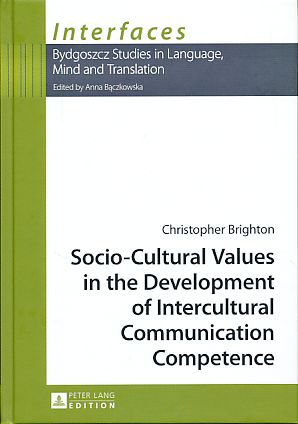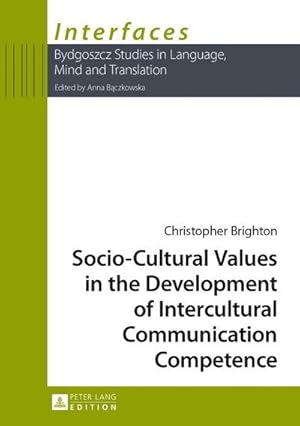9783631629604 - Socio-Cultural Values in the Development of Intercultural Communication Competence (4) (Interfaces: Studies in Language, Mind and Translation) de Brighton, Christop... (8 resultados)
ComentariosFiltros de búsqueda
Tipo de artículo
- Todos los tipos de productos
- Libros (8)
- Revistas y publicaciones (No hay ningún otro resultado que coincida con este filtro.)
- Cómics (No hay ningún otro resultado que coincida con este filtro.)
- Partituras (No hay ningún otro resultado que coincida con este filtro.)
- Arte, grabados y pósters (No hay ningún otro resultado que coincida con este filtro.)
- Fotografías (No hay ningún otro resultado que coincida con este filtro.)
- Mapas (No hay ningún otro resultado que coincida con este filtro.)
- Manuscritos y coleccionismo de papel (No hay ningún otro resultado que coincida con este filtro.)
Condición
Encuadernación
- Todas
- Tapa dura (8)
- Tapa blanda (No hay ningún otro resultado que coincida con este filtro.)
Más atributos
- Primera edición (No hay ningún otro resultado que coincida con este filtro.)
- Firmado (No hay ningún otro resultado que coincida con este filtro.)
- Sobrecubierta (No hay ningún otro resultado que coincida con este filtro.)
- Con imágenes (3)
- No impresión bajo demanda (6)
Gastos de envío gratis
Valoración de los vendedores
-
Socio-cultural values in the development of intercultural communication competence. Interfaces Vol. 4.
Librería: Fundus-Online GbR Borkert Schwarz Zerfaß, Berlin, Alemania
Originalpappband. Condición: Sehr gut. 217 S. How socio-cultural factors influence the development of Intercultural Communication Competence is an essential part of developing the skills to work and interact with a rapidly globalizing world. Building upon the work of Edward Hall, Geert Hofstede and Stella Ting-Toomey, this book explores the role in which experience, family and other social aspects play in creating an individual's ICC skills. In this work, a model of six ICC skills allows for the examination of the impact of Polish national culture on socio-cultural values of Polish students in the three mutually dependent dimensions of politics, education and family. The empirical data present clear conclusions and indications of how specific factors are relevant or irrelevant in helping to construct ICC. These findings bear implications for trainers and researchers in approaching the issue of developing intercultural competences. ISBN 9783631629604 Sprache: Englisch Gewicht in Gramm: 387.
-
SocioCultural Values in the Development of Intercultural Communication Competence 4 Interfaces Studies in Language, Mind and Translation
Librería: PBShop.store UK, Fairford, GLOS, Reino Unido
HRD. Condición: New. New Book. Shipped from UK. Established seller since 2000.
-
Socio-Cultural Values in the Development of Intercultural Communication Competence (Interfaces) [Hardcover] Brighton, Christopher
Publicado por Peter Lang Gmbh, Internationaler Verlag Der Wissen, 2013
ISBN 10: 3631629605 ISBN 13: 9783631629604
Idioma: Inglés
Librería: Brook Bookstore, Milano, MI, Italia
Condición: new.
-
Socio-Cultural Values in the Development of Intercultural Communication Competence (Interfaces)
Publicado por Peter Lang GmbH, Internationaler Verlag der Wissenschaften, 2013
ISBN 10: 3631629605 ISBN 13: 9783631629604
Idioma: Inglés
Librería: Ria Christie Collections, Uxbridge, Reino Unido
Condición: New. In.
-
Socio-Cultural Values in the Development of Intercultural Communication Competence
Publicado por Peter Lang Gmbh, Internationaler Verlag Der Wissen, 2013
ISBN 10: 3631629605 ISBN 13: 9783631629604
Idioma: Inglés
Librería: Ria Christie Collections, Uxbridge, Reino Unido
Condición: New. PRINT ON DEMAND Book; New; Fast Shipping from the UK. No. book.
-
SocioCultural Values in the Development of Intercultural Communication Competence 4 Interfaces Studies in Language, Mind and Translation
Librería: PBShop.store US, Wood Dale, IL, Estados Unidos de America
HRD. Condición: New. New Book. Shipped from UK. Established seller since 2000.
-
Socio-Cultural Values in the Development of Intercultural Communication Competence
Publicado por Peter Lang Ltd. International Academic Publishers Sep 2013, 2013
ISBN 10: 3631629605 ISBN 13: 9783631629604
Idioma: Inglés
Librería: BuchWeltWeit Ludwig Meier e.K., Bergisch Gladbach, Alemania
Buch. Condición: Neu. This item is printed on demand - it takes 3-4 days longer - Neuware -How socio-cultural factors influence the development of Intercultural Communication Competence is an essential part of developing the skills to work and interact with a rapidly globalizing world. Building upon the work of Edward Hall, Geert Hofstede and Stella Ting-Toomey, this book explores the role in which experience, family and other social aspects play in creating an individual's ICC skills. In this work, a model of six ICC skills allows for the examination of the impact of Polish national culture on socio-cultural values of Polish students in the three mutually dependent dimensions of politics, education and family. The empirical data present clear conclusions and indications of how specific factors are relevant or irrelevant in helping to construct ICC. These findings bear implications for trainers and researchers in approaching the issue of developing intercultural competences. 217 pp. Englisch.
-
Socio-Cultural Values in the Development of Intercultural Communication Competence
Librería: AHA-BUCH GmbH, Einbeck, Alemania
Buch. Condición: Neu. Druck auf Anfrage Neuware - Printed after ordering - How socio-cultural factors influence the development of Intercultural Communication Competence is an essential part of developing the skills to work and interact with a rapidly globalizing world. Building upon the work of Edward Hall, Geert Hofstede and Stella Ting-Toomey, this book explores the role in which experience, family and other social aspects play in creating an individual's ICC skills. In this work, a model of six ICC skills allows for the examination of the impact of Polish national culture on socio-cultural values of Polish students in the three mutually dependent dimensions of politics, education and family. The empirical data present clear conclusions and indications of how specific factors are relevant or irrelevant in helping to construct ICC. These findings bear implications for trainers and researchers in approaching the issue of developing intercultural competences.





